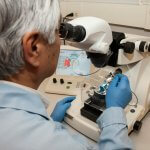Saturday 28th February is Rare Disease Day. This week we will be taking a closer look at rare metabolic disorders and how stem cells could help.
There are between 6,000 – 8,000 known rare diseases [1]; any disease affecting fewer than 5 people in 10 000 is considered rare in countries within the EU [2]. At some point in their lives 1 in 17 people will be affected by a rare disease; in the United Kingdom this amounts to approximately 3.5 million people, this also means that collectively rare diseases are not rare [3]. Sadly, 75% of rare diseases affect children and 30% of rare disease patients will dies before their 5th birthday [3].
80% of rare diseases have a genetic component [1], for parents who are aware that their children may be at risk of certain genetic conditions, they may be able to prepare for the future by arranging for their child’s umbilical cord blood to be stored to access future treatments by the child themselves or other family members who are suitably matched.
There are over 80 illnesses in which cord blood therapies are an approved treatment, many of the conditions are considered to be rare diseases. This week we will be looking at two rare metabolic conditions, the following list specifies inherited metabolic conditions where a haematopoietic stem cell transplant is a fully approved treatment:
- Aspartylglucosaminuria
- Adrenoleukodystrophy
- Alpha-mannosidosis
- Congenital Erythropoietic Porphyria
- Fucosidosis
- Gangliosidosis
- Gaucher’s Disease
- Hunter Syndrome
- Hurler Syndrome
- Hurler-Scheie Syndrome
- I-cell Disease
- Infantile Ceroid Lipofuscinosis
- Krabbe Disease
- Lesch-Nyhan Syndrome
- Metachromatic Leukodystrophy
- Maroteaux-Lamy Syndrome
- Morquio Syndrome
- Mucopolysaccharidosis
- Niemann-Pick Disease
- Sandhoff Disease
- Sanfilippo Disease
- Sialidosis
- Tay Sachs Disease
- Wolman Disease
The metabolism is the chemical process by which our bodies convert the food we eat into fuel to keep us alive. The types of food we eat can be categorized in to carbohydrates (sugars), fats and proteins. Each substance has its own special enzyme in the digestive system which can break it down so the body can utilise it. A metabolic disorder occurs when the body is unable to break down a specific substance.
Over the course of the week we will look at Hurler Syndrome and Krabbe Disease; two rare hereditary metabolic conditions which can be treated with umbilical cord blood stem cells.
[1] http://www.raredisease.org.uk/about-rare-diseases.htm








